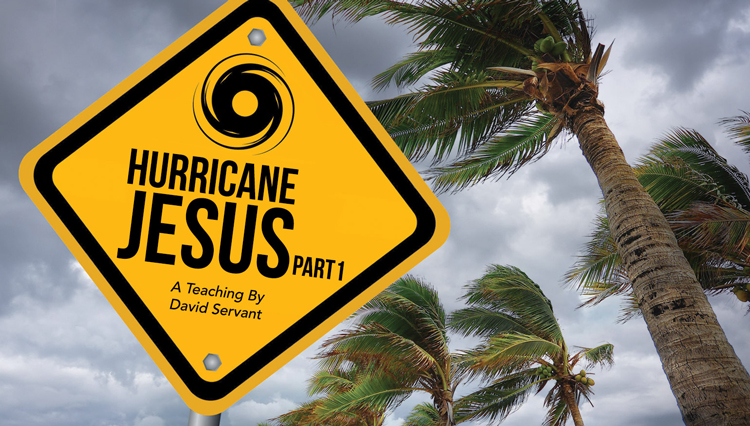The e-teaching that follows, which I originally wrote after Hurricane Katrina bombarded New Orleans in 2005, seems appropriate to re-publish now. For the first time in recorded history, two Category 4 or higher hurricanes have struck the U.S. mainland in the same year. “That is extraordinary by itself,” according to AccuWeather founder Dr. Joel N. Myers, but “also unprecedented is that this particular storm, Irma, has sustained intensity for the longest period of time of any hurricane or typhoon in any ocean of the world since the satellite era began.” Might there be a divine message hidden in these recent hurricanes? Keep reading! – David

Over the past few months in my e-teachings we’ve been taking a look at who God really is—as He has revealed Himself in Scripture—which is quite different than how He is often revealed in modern Christendom. We’ve not only considered His amazing love and mercy, but also His “holy hatred.” That holy hatred is often referred to using other phrases, such as “God’s righteous wrath,” or “His holy indignation,” but all refer to the same aspect of God’s character. And as we’ve seen, God’s Word does indeed speak of His hatred, using the very word hate (for proof, click here to read last month’s e-teaching). There is no escaping this.
It seems that some professing Christians would prefer to adjust the Bible rather than adjust their conception of God, because they don’t want to acknowledge that particular aspect of God’s character. They only want to acknowledge His love and mercy. The truth, however, is that God can be neither loving nor merciful unless He is also wrathful. This is easily understood. If you have two children whom you love and one wrongfully harms the other, you must administer justice. You must punish the offender. If you don’t, you will be rightfully accused of not loving the victim. Love “does not rejoice in unrighteousness” (1 Cor. 13:6). If God is love, He must also be righteous and wrathful.
Likewise, if God is merciful, He must also be wrathful, otherwise there is no need for Him to be merciful. His mercy presupposes His wrath. It is only His mercy that restrains His wrath.
Believing that God is loving and merciful while denying that He is wrathful is akin to believing in Jesus but not Christ. So not only is the common “all-love-no-wrath” portrayal of God completely unscriptural, it is also completely illogical to the point of nonsense.
Moreover, to deny God’s holy wrath is to deny the Bible, which is full of thousands of references to that aspect of His character. To deny God’s wrath is to deny the very thing from which Scripture says we have been saved (see Rom. 5:9). To deny God’s wrath is to make meaningless Christ’s death on the cross, where He became the “propitiation for our sins” (see Rom. 3:25, Heb. 2:17, 1 John 2:2, 4:10). To propitiate means to appease someone’s wrath, which is what Jesus did through His suffering—He appeased God’s wrath. Thus the wrath of God is foundational to the gospel. Without it, there is no gospel.
Some years ago during a question and answer session at a large pastors’ conference hosted at a Texas mega-church, I asked the successful senior pastor this simple question: “Is it ever appropriate for a pastor to preach about the holiness, wrath or judgment of God?” He laughed as he tossed my written question into the trash can and said, “God called me to preach the good news.” He sent a clear message to the hundreds of pastors present: If you hope to be successful like me, stick with positive sermons. The holiness, wrath and judgment of God don’t fit into the category of “good news.”
His response sounded logical, but was it biblical?
The fact is, if God is not holy and wrathful, then there is no good news to tell because there is no hell, no one is in any danger, no one needs to be saved, and no one needs to repent and believe in Jesus. God’s wrath is foundational to the gospel, as Paul makes ever so clear in his defense of the gospel in the first three chapters of Romans. Verse after verse in that passage is devoted to establishing the fact that “the wrath of God is revealed from heaven against all ungodliness and unrighteousness of men” (Rom. 1:18). There Paul wrote, “According to my gospel, God will judge the secrets of men through Christ Jesus” (Rom. 2:16, emphasis added). God’s judgment was part of Paul’s gospel.
Scripture also says that John the Baptist preached the good news of the gospel (using the very word “gospel”; see Luke 3:18), yet his message was all about God’s judgment and the need for repentance (see Luke 3:1-18).
Jesus preached what the Bible calls the gospel (see Mark 1:14-15; Luke 4:18), yet He regularly warned sinners of God’s wrath and called them to repentance (see, for example, Matt. 4:17; 5:22, 29-30, 8:11-12; 10:28; 11:20-23; 13:41-42, 49-50; 18:19; 22:13; 23:33; 24:50-51; 25:30).
As the early apostles obeyed Jesus and went everywhere preaching the gospel, they, like Jesus, often warned of God’s judgment and called sinners to repentance, which by itself certainly implies the idea of God’s wrath. Paul, for example, declared in Athens,“God is now declaring to men that all everywhere should repent, because He has fixed a day in which He will judge the world in righteousness through a Man whom He has appointed, having furnished proof to all men by raising Him from the dead” (Acts 17:30-31, emphasis added).
All of this being so, it is a grave error to say that preaching the good news prohibits the mentioning of God’s judgment. Yet the successor of that pastor who laughed at my question has followed the guidance of his predecessor (his father) and has now built the largest congregation in the United States. (His city just suffered the costliest natural disaster in U.S. history.) He recently said on a nationally-televised secular interview that he never uses the word “sinner,” would never condemn people who visit his church by using that term, and certainly does not preach any sermons that mention God’s wrath. There are tens of thousands of other pastors just like him.
How sad it is when so many preachers attempt to tone down the idea of God’s wrath, apparently embarrassed about it, and so they use many softening expressions to hide the actual truth. Hell, for example, is rarely mentioned, and when it is, it is often only spoken of as “a place where you will be eternally separated from God” (which might actually sound quite appealing to people who have spent all of their lives trying to keep themselves separated from God).
Masking the solemn truth regarding more temporal manifestations of God’s wrath, some explain the suffering of sinners as being only the result of “God removing His hand of protection.” Thus, rebels aren’t suffering because of God’s active wrath or anger, but because of some other unidentified hurtful force. Some go one step further and name Satan as the bad guy who does those terrible things that a loving God would never do. Hurricane Katrina has certainly fallen into this category, now being called demonic by some.
But what does the Bible say regarding the source of hurricanes?
And the Lord hurled a great wind on the sea and there was a great storm on the sea (Jonah 1:4, emphasis added).
Thus says the Lord, who gives the sun for light by day, and the fixed order of the moon and the stars for light by night, who stirs up the sea so that its waves roar; the Lord of hosts is His name (Jer. 31:35, emphasis added).
Therefore, thus says the Lord God, “I will make a violent wind break out in My wrath. There will also be in My anger a flooding rain and hailstones to consume it in wrath” (Ezek. 13:13, emphasis added).
“I smote you and every work of your hands with blasting wind, mildew, and hail; yet you did not come back to Me,” declares the Lord (Hag. 2:17, emphasis added).
Those who go down to the sea in ships, who do business on great waters; they have seen the works of the Lord, and His wonders in the deep. For He spoke and raised up a stormy wind, which lifted up the waves of the sea. They rose up to the heavens, they went down to the depths; their soul melted away in their misery….Then they cried to the Lord in their trouble, and He brought them out of their distresses. He caused the storm to be still, so that the waves of the sea were hushed (Ps. 107:23-29, emphasis added).
Some point out the fact that, because Jesus once rebuked the wind and the waves on the Sea of Galilee, such storms must be demonic, as Jesus would never rebuke something that God caused. We just read a verse, however, that clearly declared that God spoke and caused a stormy sea, and then He stopped the same storm that He started. It could well have been the same case that stormy day on the Sea of Galilee. Moreover, Jesus didn’t rebuke God; He rebuked the wind and waves.
Regardless, Jesus’ calming of the violent storm on the Sea of Galilee should be proof enough that God can stop a hurricane if He desires. It would seem logical to think that the One who created the wind and the sea could keep them from getting out of control. So even if God did not send Hurricane Katrina, He must not have wanted to stop it. (For other scriptures that prove God’s control over the wind, see Gen. 8:1; Ex. 10:13, 19; 14:21; 15:10; Num. 11:31; Ps. 48:7; 78:26; 135:7; 147:18; 148:8; Jer. 4:11-12; 10:13; 51:16; Amos 4:9, 13; Jon. 4:8; Hag. 2:17; Rev. 7:1. Only once in Scripture is Satan given credit for a destructive wind, and in that case Scripture makes it emphatically clear that he first had to obtain permission from God; see Job 1:12, 19).
What could have possibly motivated God to send (or refuse to stop) such a devastating wind on the scale of Katrina to the coasts of Louisiana, Mississippi and Alabama, doing incalculable damage, and causing almost unimaginable human suffering? The only logical and biblical possibility is that God was motivated by anger. His anger, of course, is not senseless, but always justified by people’s rebellion against His commandments.
Understanding this truth, many Christians have attempted to show specific reasons why New Orleans, rather than other cities, was apparently targeted for divine displeasure. I must confess that I am tempted to agree with them. The reports I’ve read from believers who travel each year to proclaim the gospel during the New Orleans Mardi Gras are sickening. One friend wrote:
I have been to the French Quarter of New Orleans during Mardi Gras. I have been to the homosexual district and seen people “carousing in broad daylight.” I have seen people parading naked down the streets walking in their filth and sin. I preached the gospel the night before Fat Tuesday earlier this year as hundreds of Roman Catholics made excuses for their sin and immorality before a holy God and justified their sin by telling me that they could sin all they wanted as long as they “went to confession” on Ash Wednesday and somehow it was all better in God’s sight!….New Orleans is the Voodoo capital of the U.S.A. I have seen hundreds of fortune tellers on the streets, and many of them would rail curses at me after I handed them a gospel tract (one in particular spitting on it, pronouncing curses and cursing “my Jesus”). I saw thousands and thousands of idols and things which pertain to witchcraft and satanism.
Yikes!
Perhaps you’ve heard that since 1972, New Orleans has been the host city of the annual “Southern Decadence Day,” which would have been held this very weekend, as it has every Labor Day weekend for the past thirty-three years. It is touted as “one of the gay world’s major parties,” and a “gay Mardi Gras” when tens of thousands of gay men and lesbians descend on the French Quarter for unrestrained public lewdness and drunkenness. In 2003 it pumped $95 million into the local economy, which is why city leaders refused to shut it down in spite of protests by more decent people. Is it possible that after thirty-three years God had enough and decided to shut it down?
New Orleans has also seen an incredible amount of looting, arson, rape, murders, gang violence, and general lawlessness after Katrina, something that was not seen in the countries hit by last December’s tsunami. One Sri Lankan observed, “I am absolutely disgusted. After the tsunami, our people, even the ones who lost everything, wanted to help the others who were suffering. Not a single tourist caught in the tsunami was mugged. Now with all this happening in the U.S. we can easily see where the civilized part of the world’s population is.” (Ouch!)
Reports such as these certainly tempt us to assume New Orleans was more deserving of devastation than other U.S. cities. Yet we should keep in mind Jesus’ cautions about making such judgments (see Luke 13:1-5). What other American city or town can claim exemption from deserving God’s judgment? If God is sending a message to New Orleans, He is also sending a message to everyone in this country. Katrina is affecting us all, taking a bite out of each of our wallets. Gas stations here in Pennsylvania certainly aren’t offering any discounts. Once again, God has clearly displayed His temporal wrath to the United States, and He wants all of us to know that, as Jesus said, “Unless you repent, you will all likewise perish” (Luke 13:3, 5).
What about the righteous folks in New Orleans, the true followers of Christ? Is God punishing them?
That can’t be the case, of course. But God is obviously testing them. I suppose He is also testing the rest of us who profess to be Christ’s followers and have means to help our suffering brothers and sisters.
“In Wrath Remember Mercy” (Hab. 3:2)
Finally, not only can we see God’s wrath displayed in the recent hurricane, but we also can just as easily see His incredible mercy. How so?
First, because we know that God is “slow to anger,” when we finally do see His anger manifested (which even then is still restrained), we know that His mercy has been restraining His mounting wrath for a long time. Instead of asking “Why?,” we should be asking, “Why not years earlier?” The answer is, “God is merciful.”
Second, the storm could have been worse, much worse. Katrina could have killed millions. (The people of Sodom and Gomorrah would gladly have traded cities with New Orleans.) God has warned the unrepentant who have survived Katrina in hopes that they will repent and escape what will be much worse than Katrina. That warning is another evident display of God’s mercy. Instead of asking “Why so much devastation and suffering?” we should be asking, “Why not more devastation and suffering?” The answer is, “God is merciful.”
All of this being so, we might be more correct in saying that New Orleans was specifically targeted for God’s mercy rather than His wrath. If I was on the sure road to hell right now, it would be better for me to be living in New Orleans than perhaps any other place in the U.S. (as long as I survived Katrina, that is). I would have a firsthand view of God’s temporal wrath, and there might now be instilled in me some fear of God—which is the beginning of wisdom (see Prov. 9:10). I would rather be repenting amidst the rubble of my house in New Orleans than continuing in my rebellion as I sit in my jacuzzi in Wichita.”Where sin abounded, grace did much more abound” (Rom. 5:20).
Again and most importantly, God has mercifully sent yet another warning to us all. Will we heed His message this time? If not, there are certainly worse judgments to come, greater manifestations of God’s temporal wrath, as He mercifully hopes to motivate us to repent and escape eternal death.
Finally, will the pastors, preachers and prophets in America rise to the occasion to courageously proclaim the truth? Or will they actually work against Christ and assist Satan in what he specializes in—spreading lies about himself and God? God has just roared at America one more time. Will His spokespersons now remain silent? Or worse, will they say that God has not roared? Who will proclaim what the Bible repeatedly declares from cover to cover? Who will love people enough tell them the truth? Who will seek the approval of God rather than the approval of men? Who will be truly Seeker-sensitive, that is, sensitive to the One who came to seek and save the lost, and who died in His passion to save them from hell? Who will cry out, like Isaiah of old,
Alas, sinful nation, people weighed down with iniquity, offspring of evildoers, sons who act corruptly! You have abandoned the Lord, you have despised the Holy One of Israel, you have turned away from Him. Where will you be stricken again, as you continue in your rebellion? (Is. 1:4-5, emphasis added).
To read Part 2 of this teaching, in which David answers objections, click here.


